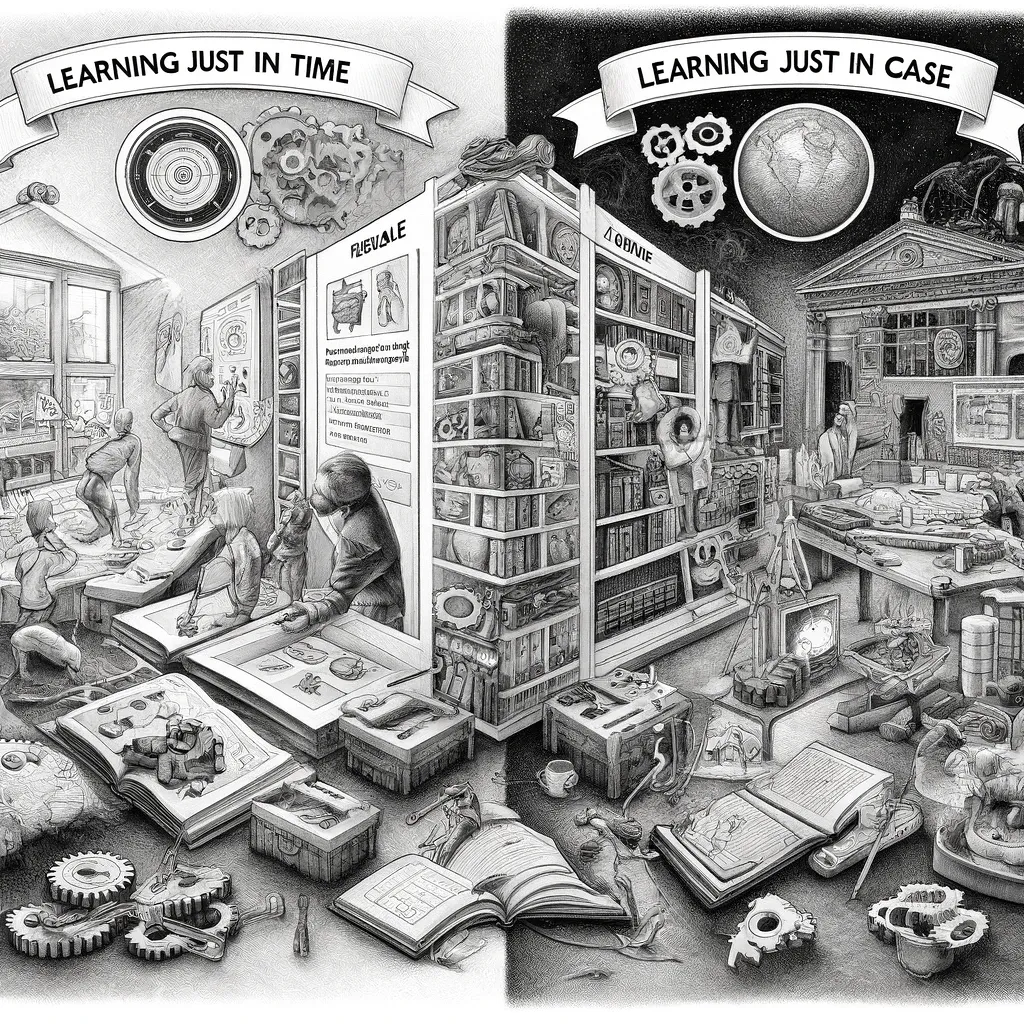Choose Active Learning over Learning Just in Case
Learning just in time and just in case are both useful. But there's a balance to be found, and strategic thinking to apply. Be mindful of what, why and how you learn.

In this article, I want to discuss the differences between learning just in case and learning just in time. Both are really useful, but one clearly has my preference. Let me explain why.
Introduction
When it comes to learning, there are different schools (literally), and many different approaches. When teachers are involved, their own views/beliefs about education heavily influence the way they explain and advise. When we learn on our own, our experiences with education heavily influence us. Moreover, our current environment also influences the way we learn. As I've argued in the past, it is really valuable to understand how you best learn, in order to maximize the benefits for your future self. But beyond the how, we must also consider the what and the why.
Learning Just in Case
Learning just in case is when we learn new things, thinking that we might benefit at a later point in time. The education system spends a lot of energy actually forcing us to learn things "just in case". That's not necessarily how they put it, but it doesn't make a lot of difference. What ends up in the curriculums corresponds to what the educators/teachers/"the system" believe is most relevant/useful/important/required for us to learn about. Unfortunately, I've come to realize that an awful lot of what I was taught was actually (1) meaningless (2) obsolete (3) useless in practice (4) plain wrong... There are various reasons for this.
Some teachers:
- Fail to follow the evolutions in their fields
- Teach subjects that are too broad/vague
- Don't have time and can only share general information
- Lack have practical experience
- Are too opinionated
- Don't have energy at the moment and fail to transmit what matters
- Simply don't care or are not good educators
As a result, we end up with many courses where we waste time and energy without knowing why, apart from getting certificates/diplomas. Also, when we learn just in case, we often have to rely on memorization. And our memory clearly can't be trusted, meaning that we will have to re-discover and/or re-learn later on.

Learning for the sake of learning can be a really fun endeavor. It can also open doors in our minds, and help us connect different mental models together, which can change our views of the world and help us go further. In addition, if we have enough time, we can actually go deep on certain topics, which can be useful. In that sense, learning "Just in Time" is almost always "good". That being said, it can be very costly, useless, and even end up preventing us from reaching our goals.
That's why it's important to realize when we are actually learning "Just in Case". We should always try to clarify if and how what we are learning about will be useful later on. We need to question everything, and to make conscious choices about our education!
Learning Just in Time
The other approach is to learn "Just in Time". It's when we learn about something because we realize we have an immediate need to know about it. Instead of learning things because they might be useful at some point, we learn about them so that we can do something. Learning "just in time" is what most of us, knowledge workers, do on a daily basis. Whenever we stumble on new challenges that go beyond our current knowledge/skill set, we have no choice but to learn, or hack our way around.
When we learn things just in time, we have to optimize our efforts. We skim through the noise, and try to find as much signal as we can. We try to identify the key elements, theories, experts, practices, approaches, tools, etc. We focus on creating or expanding our mental models to help us make sense of the problem space. We learn just enough. No more, no less. No more because we generally don't have time to waste. No less because, otherwise, we can't move forward.
Learn at the last responsible time
Learning "Just in time" is heavily biased towards action. Instead of exploring, we're finding a way forward. It's a very different starting point, and it implies a very different approach, compared to learning "just in case".
The main benefit of learning "just in time" is that it limits waste. It saves energy for action. It helps with problem-solving, enables informed decision-making and problem-solving.
The main drawback is that it doesn't leave much space for exploration. Generally speaking, when we need to act, we can't sit around for days, exploring ideas and concepts. It's not always true, though, I know
Applying the Pareto Principle to learning
I'm a big fan of the Pareto Principle, the famous 80-20 rule. I think it applies to learning "just in case" vs "just in time". I consider that it is useful to learn about things just in case about 20% of the time. No more. That way, during the remaining 80% of my time, I can focus my energy on more important/relevant things, such as making important decisions, taking action, solving problems, and learning what I know for a fact will help me move the needle forward.
The balance between learning "just in case" vs "just in time" really matters. It's actually a balance to find between mind expansion and problem-solving. But at the end of the day, whether we learn "just in case" or "just in time", the most important point is to filter through the noise. Learn from first principles, connect the dots and create/strengthen our mental models.
Conclusion
Learning "just in time" and "just in case" are both useful. But a balance needs to be found between exploration and "utility". Whatever you learn, and whenever you do, consider the what and the why; not only the how. Take some time to explore, expand your mind and prepare yourself for solving any problem that the world throws at you.
Have you found that balance just yet?
About Sébastien
I'm Sébastien Dubois, and I'm on a mission to help knowledge workers escape information overload. After 20+ years in IT and seeing too many brilliant minds drowning in digital chaos, I've decided to help people build systems that actually work. Through the Knowii Community, my courses, products & services and my Website, I share practical and battle-tested systems. You can follow me on X 🐦 and on BlueSky 🦋.
I am an author, founder, and coach. I write books and articles about Knowledge Work, Personal Knowledge Management, Note-taking, Lifelong Learning, Personal Organization, and Zen Productivity. I also craft lovely digital products.
If you want to follow my work, then become a member and join our community.
Ready to get to the next level?
If you're tired of information overwhelm and ready to build a reliable knowledge system:
- 🎯 Join Knowii and get access to my complete knowledge transformation system
- 📚 Take the Course and Master Knowledge Management
- 🚀 Start with a Rock-solid System: the Obsidian Starter Kit
- 🦉 Get Personal Coaching: Work with me 1-on-1
- 🛒 Check out my other products and services. These will give you a rock-solid starting point for your note-taking and Knowledge Management efforts





